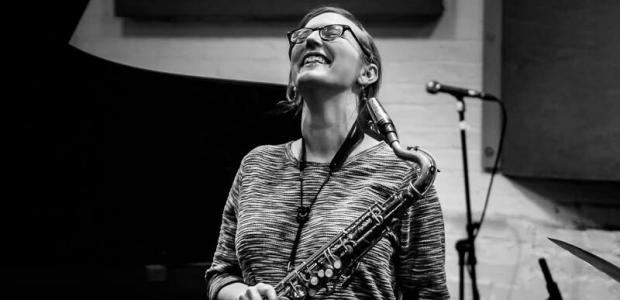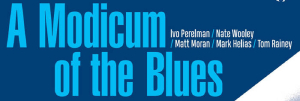Anna Webber - I’ve always been drawn to percussion music

Anna Webber is an young saxophonist, flutist and avand-gard composer. In February she released her new album “Clockwise” – a debut for Pi Recordings. In this interview she told me about her attitude to percussion music, contemporary composers and her cooperation with new label.
On your last release – “Clockwise” you’re focusing on percussive and rhythm aspects of classical contemporary music. As inspiration you use pieces, written for percussionists, such composers like Morton Feldman or John Cage. Why are you so much interested in rhythm? What is so special about pieces written for percussionists?
The journey to writing the music for Clockwise was somewhat convoluted. I had a Berlin-based group, Percussive Mechanics, for several years, and was about to start writing a third album for them. This band had two drummers, and writing music for two drummers that necessitated the use of both of them (ie, was not playable by a single drummer, didn’t just use the two drummers as some sort of visual party trick) was a big challenge for me. For the third album, I wanted to study percussion music in order to become better at writing for two drums. I embarked on a path of research and study that didn’t just involve 20th century classical music – I was also checking out world music traditions such as Haitian drumming and Gamelan, looking at percussion rudiment books, and transcribing jazz drum solos. In fact, I transcribed and arranged a solo drum piece by Baby Dodds for that band.
Long story short, the label that Percussive Mechanics was on went under, and running a band in a continent I didn’t live in was becoming more and more difficult. So I ended up breaking up the band and cancelling the recording project. But I wanted to continue the work I’d started, and decided to start a new group in New York to be the compositional vessel for the music based on this research. I narrowed my focus to pieces inspired by 20th century classical composers. All of the pieces that inspired the music on Clockwise are pieces that I’ve loved for a long time. I’ve always been drawn to percussion music. I can’t say exactly why, but one element of it is that music for percussion – excluding mallet percussion - is automatically divorced from pitch (in a twelve tone sense), and therefore from what we’d traditionally think of as harmony and melody. And rhythm is, of course, always very important to anyone who plays any sort of music coming from the jazz tradition.
Do you remember your first contact with music by Cage, Stockhausen, Feldman? Did you like it for the first time?
I don’t remember any sort of specific road-to-Damascus-esque first encounter, but I learned about most of these composers in an undergraduate class on 20th century history and theory. I remember enjoying the music the first time I heard it, but it wasn’t until several years later, during my master’s degree in New York, that I started listening to classical music regularly and voluntarily.
Which aspects of indeterminacy in music do you appreciate / like the most?
As an improviser who writes music for improvisers, but who also tends to write a lot of notes on the page, I’m constantly exploring levels of determinacy and indeterminacy in my work. Improvisers, myself included, tend to be happiest and therefore sound best when they have a little freedom with notated music – and the freedom doesn’t have to be a big solo feature, it can also be the freedom to interpret and shape a melody however they want. Between those two extremes (ie melodic interpretation and solo feature), there is a huge range of things that can happen that count as improvisation on some level. For example, someone can have a specific rhythm to play, but freedom to choose the pitches. Or they can have specific pitches, but freedom to choose the rhythms. They can play secondary or tertiary solos behind someone who is the main soloist. The list is long, and all of these types of devices contribute to blurring the line between the written material and the improvisations, which is a major concern of mine, and something I continue to be fascinated by.
On “Clockwise” you are surrounded by many great improvisers. Can you point some specific features which you’ve gained from each of them?
I have worked with all of the guys on Clockwise in various other situations over the years – some extensively, some less so. Matt Mitchell, for example, plays in my Simple Trio alongside John Hollenbeck, I’ve played in a couple of his bands (notably, on his album “Pouting Grimace”), and we’ve been in several sideman projects together too. So I’ve worked with, toured with, and written for him a lot, and we’re close friends. I’ve learned tons about composition, and music in general, from him. When I first played his music, it was most rhythmically complex stuff I’d ever played, and I learned a lot from spending time with his compositions.
Matt’s the guy I’d worked with most closely prior to starting this band, but I also play in Ches Smith’s band Laugh Ash (where he mostly plays vibraphone and electronics), in a new big band project that Jacob Garchik’s put together, and I’ve subbed for Jeremy Viner in Battle Trance. Jacob, Jeremy, Matt, Chris Tordini and I all play together in John Hollenbeck’s Large Ensemble. Christopher Hoffman and I have played together in Jen Shyu’s “Jade Tongue”. Across the board, I’ve been a fan of all of these guys for years, and it was a huge thrill to hear them interpret my music!
It is your first release in Pi Recordings. What are your impressions about this label?
Pi was my dream label when I started conceiving of this album, and I was so happy that they were interested in releasing it! I’ve been involved in a few albums that came out on Pi in the past – the Matt Mitchell album I mentioned earlier, as well as Jen Shyu’s “Song of Silver Geese” and Dan Weiss’ “Sixteen”. They’ve been putting out consistently great albums for so long, and in my mind they are the best record label out there for the kind of music that I make.
What is the most important thing, on which you pay attention, while cooperating with label?
All labels have different deals, financially, and I know some people wonder when they put out an album if it’s even worth looking for a label. It’s becoming less and less necessary to release albums on an established imprint – it’s possible to get press and gigs with a self-release too. But a label can be a great creator of community! It’s a really beautiful thing when labels create dialogues between artists by the simple act of releasing albums next to eachother. I think it’s important, when looking for a label, to look at those labels who are releasing work by artists who you find inspiring and whose priorities seem similar to your own.
Do you remember the specific moment when you’ve made decision about becoming a professional musician?
I was always very involved in music as a kid, but I decided fairly late, relatively speaking, to actually pursue it. That is to say, I decided after I graduated highschool, whereas I know many of my friends had that decision locked down when they where younger teenagers. I had applied to university to study anthropology, thinking I’d do music as a minor. I was trying to be pragmatic – I knew music was important to me, but I didn’t want to take the risky path and do music for a living. But during the summer between highschool and college, I was at a summer jazz program and I realized not only that I wanted to study music, but also that I didn’t want to have a back-up plan (ie study another subject in case music didn’t work out). So that was the point when I dove in headfirst.
Did you study composition? What type of a student were you?
I did both my undergraduate and master’s degree in jazz performance (at McGill in Montreal and Manhattan School of Music in New York, respectively). I subsequently applied to do a second master’s degree at the Jazz Institute Berlin, which is when I started taking composition more seriously. That program wasn’t a comp degree per se, but I was studying with John Hollenbeck, and spending hours each day writing for the group that eventually became Percussive Mechanics.
I was always a good student! I liked being in school and did fine in academic environments.
You also play some solo gigs. Are you planning releasing a solo album?
Yes, I’ve been playing solo pretty frequently this past year. I’m not planning on releasing a solo album, but I would like to document my solo work somehow. I’ll probably end up doing a Soundcloud release, or put it out on some other digital platform. Being a bandleader is very demanding because you have a lot of responsibility both logistically leading up to the gig and musically during the gig. But playing alone is a whole different thing – it’s certainly been a learning curve for me to figure out how to relax on stage when I’m the only one up there. And my solo set is pretty demanding physically in a way that is rarely asked of me when I play with a band.
- Aby wysyłać odpowiedzi, należy się zalogować.







